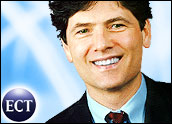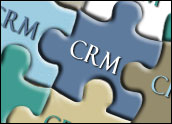
It is turning into a busy end of the year with the CRM and Software as a Service industries advancing on multiple fronts. So far, we’ve had Dreamforce and all of the announcements that went with it. SAP has announced SAP Business ByDesign, available in 2008, and last week made NetWeaver available by subscription too. Salesforce.com and SAP are doing a lot to define two very different strategies for the future of enterprise computing.
NetSuite might go public this quarter, too, giving this front and back office SaaS vendor some cash to do more marketing. Money is the oxygen of marketing and the complexion of the market will surely change when NetSuite has more of it. Oracle has yet to weigh in, but you know with Oracle Open World happening in a few weeks that they might have a few things up their sleeves.
Quality vs. Quantity
It has been a couple of years since the brouhaha that surrounded Oracle’s insatiable appetite for acquisitions, which resulted in Peoplesoft, J.D. Edwards and Siebel becoming divisions of the database powerhouse. At the time, Larry Ellison wanted to ensure that his company continued to have the critical mass to compete with other large software companies like Microsoft and especially SAP.
Ellison’s acquisitions ensured that Oracle would have the quantity of products needed to achieve the goal of being one of the biggest software companies in the known universe, but the redundant array of similar products gave us (OK, me) the feeling that we were seeing a conspicuous display of quantity but not necessarily one of quality.
The constellation of CRM applications bought by Oracle and added to its stable were just so many versions of the same stuff. Later that “stuff” got a label — 1.0 — when the savvy, or maybe it was just savants, decided that everything needed a 2.0 label to be valid, and the old stuff became 1.0 by default. Soundings I have collected recently tell me that Oracle might be on the path to reinventing its CRM offerings for this brave new 2.0 world.
If that’s so, we’ll know soon enough; with Open World just a few weeks off, product is either finished and awaiting its debut or product managers are saying wait till next year. All this discussion about all things 2.0 — Web, business, CRM, etc. — couldn’t happen soon enough as far as I am concerned. It seems like the 1.0 world was been around for a New York century and it had an old feel to it.
What Customers Want
Interestingly, the other day, the duo who helped to usher in part of the 2.0 sensation, Joe Pine and Jim Gilmore, sent me their latest book. You might recall Gilmore and Pine as the authors of “The Experience Economy,” the book that launched the whole customer experience trend.
I think one of the reasons these business writers felt the need to write a new book was the way they saw their idea of staging customer experiences hijacked by business people trying to slap a label on some things that were obviously not focused on customer experience and were instead driven down a rat hole.
The new book’s title, “Authenticity: What customers really want,” says it all. Unfortunately, the authors keep on going and not always in ways that feel terribly authentic. The book gets off to a slow start by diving too deeply into philosophical constructs that are best left for more rigorous academic study by asking and answering:
Statements like that kind of make you wish you had a strong espresso, a beret, and an unfiltered cigarette to savor while reading. Fortunately, postmodernism dies a quick death and you can continue on your journey into the authentic, and there is much to recommend about this book.
Trying Too Hard
For starters, it brings into focus the ways business is in many ways trying too hard to turn everything into an experience and in so doing overshooting the mark by subverting the customer’s real experience — like making a sweeter version of saccharine.
All this will have a lot of impact on CRM and related disciplines. Recall for a moment that “The Experience Economy” has a copyright date of 1999 which means that many of the ideas in it were percolating in its authors’ heads for a couple of years prior to that.
Also keep in mind that it has taken many years for some of those ideas to penetrate business to the point that software vendors are including its concepts into the functionality of their products. The same is true for authenticity — it will take time for this new buzz to penetrate.
So, ironically, despite all the success and great achievements many software vendors are celebrating this fall, with one swift publishing event, the world has been made new again and software — and businesses — are again in catch-up mode.
As if that weren’t enough, it is not immediately clear whether CRM per se is the vehicle for authenticity, and, in fact, the over rendering of reality by sales, service and marketing may automatically disqualify CRM from taking center stage in the new derby.
Walking the Walk
Authenticity is all about walking the walk. Businesses using CRM, or at least CRM 1.0, have been very much about talking the talk and it may be left for a new and relatively un-sexy software discipline — GRC — or its offshoots, to deliver the verisimilitude that Pine and Gilmore think is missing.
If you are unfamiliar with GRC it stands for governance, risk and compliance and it feels like the business equivalent of eating your spinach. However, at its nittiest and grittiest, GRC is about proving that you walk the walk, and having the records and standards that support you.
GRC won’t supplant CRM, it will support and enhance it, I think. It will take another five to 10 years to get it all right and it will fuel many software vendors’ development plans for quite a while.
I can’t believe I just used the word “verisimilitude.” Where’s my beret? Somebody get me an unfiltered Camel.
Denis Pombriant is the managing principal of the Beagle Research Group, a CRM market research firm and consultancy. Pombriant’s research concentrates on evolving product ideas and emerging companies in the sales, marketing and call center disciplines. His research is freely distributed through a blog and Web site. He is working on a book and can be reached at [email protected].






















































